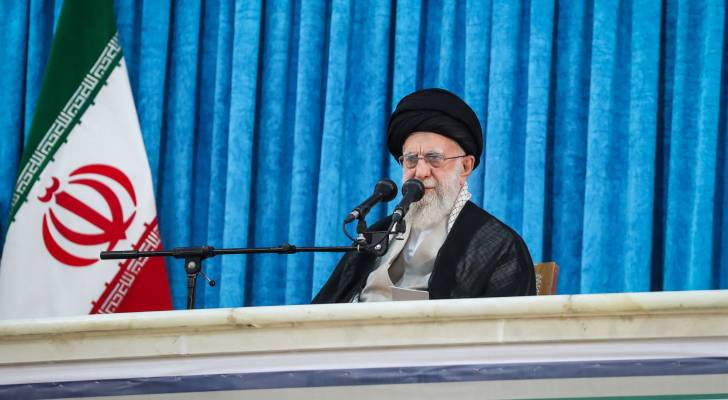Iranian supreme leader Ayatollah Ali Khamenei said the US proposal for a nuclear deal was against the country's national interest.
Iran defies US on enrichment ahead of nuclear talks
Iran vowed Thursday to significantly increase its enriched uranium output in defiance of US demands, ahead of a round of nuclear talks overshadowed by fears of an imminent “Israeli” attack.
The announcement came after the UN's International Atomic Energy Agency (IAEA) accused Iran of non-compliance with its obligations. “Israel” said the world must respond "decisively".
The United States and other Western countries, along with “Israel”, have repeatedly accused Iran of seeking a nuclear weapon, which it has repeatedly denied.
Ahead of Sunday's sixth round of US-Iran talks in Oman, the Islamic republic threatened to strike American bases in the region if the negotiations break down and conflict erupts.
"If the talks fail, the risk of military escalation becomes much more immediate," said Hamidreza Azizi, a visiting fellow at the German Institute for International and Security Affairs.
Uranium enrichment is a central dispute, with Iran defending it as a "non-negotiable" right in its pursuit of a civilian nuclear programme, while the United States has called it a "red line".
Iran's foreign minister and chief negotiator, Abbas Araghchi, said the IAEA's resolution "adds to the complexity of the discussions".
"We will be in Muscat to defend the rights of the Iranian people," he said.
“Extremist”
The IAEA's board of governors adopted a resolution condemning Iran's "non-compliance" with its nuclear obligations under the Non-Proliferation Treaty (NPT), carried by 19 votes in favour, out of 35 in total, diplomats said.
The resolution could lay the groundwork for European countries to invoke a "snapback" mechanism by reinstating UN sanctions under the 2015 Iran nuclear deal -- an option that expires in October.
Iran's nuclear chief, Mohammad Eslami, slammed the resolution as "extremist", blaming “Israeli” influence.
Iran, he said, had upheld its commitments under the NPT but rolled back adherence to the 2015 deal after Donald Trump withdrew the United States from the accord during his first term as US president.
"They can't expect us to fulfil them without them (Western countries) honouring any of their commitments," said Eslami.
In response to the resolution, Iran outlined its next steps.
"The necessary orders have been issued by the head of the Atomic Energy Organization (of Iran) to launch a new enrichment centre in a secure location," the organisation and foreign ministry said.
Iran would also replace "all of these first-generation machines with sixth-generation advanced machines" at the Fordo uranium enrichment plant, spokesman Behrouz Kamalvandi said.
This means "our production of enriched material will increase significantly", he added.
Eslami said enrichment would begin at the new "invulnerable" site when machines were installed.
Iran currently enriches uranium to 60 percent, far above the 3.67-percent limit set in the 2015 deal and close, though still short, of the 90 percent needed for a nuclear warhead.
Threats to US bases
Omani Foreign Minister Badr Albusaidi confirmed the "6th round of Iran US talks will be held in Muscat this Sunday", in a post on X.
Trump appeared to shift his previously optimistic tone on the talks this week, saying he was "less confident" a deal could be reached.
On Wednesday, following Iran's threat to hit US bases in case of war, Trump said US personnel were being moved from the potentially "dangerous" Middle East.
On Thursday, the US embassy in Jerusalem restricted staff movements over security concerns, citing "increased regional tensions".
A US official had earlier said staff levels at the embassy in Iraq were being reduced over security concerns.
“Strategic mistake”
“Israel “has repeatedly warned it could attack Iranian nuclear sites, vowing to stop it acquiring an atomic bomb.
It said Iran's "actions undermine the global non-proliferation regime and pose an imminent threat to regional and international security and stability".
Reports in US media, including NBC and The New York Times, this week said “Israel” was considering taking military action against Iran, likely without US support.
"While it's possible the show of force from the US and “Israel” is meant to create pressure that leads to a diplomatic breakthrough, the stakes are very high and both sides appear deeply entrenched," political expert Azizi said.
"Without progress on core demands, diplomacy may only delay, not prevent, confrontation."
Iran has vowed to respond to any attack.
"All its (US) bases are within our reach, we have access to them, and without hesitation we will target all of them in the host countries," Defence Minister Aziz Nasirzadeh said.
"God willing, things won't reach that point, and the talks will succeed."
Following Iran's vow to increase enrichment, the European Union called on it "to show restraint".
Iran's permanent UN representative Amir Saeid Iravani has said Tehran will consider "proportionate responses" if the snapback mechanism is triggered -- including "starting the process of withdrawal" from the NPT.




